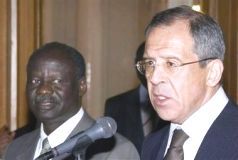Sudan’s support crucial for UN peacekeeping in Darfur – Russia
May 17, 2006 (MOSCOW) — Russia’s foreign minister said Wednesday the U.N. should only take over peacekeeping in Darfur from the African Union in consultation with Sudan’s government, which has been opposed to the mission.
 Sergey Lavrov said that a U.N. Security Council resolution passed Tuesday pressing Sudan to cooperate with the proposed U.N. force didn’t remove the necessity to obtain Khartoum’s consent. Lavrov spoke following talks with Sudan’s Foreign Minister, Lam Akol.
Sergey Lavrov said that a U.N. Security Council resolution passed Tuesday pressing Sudan to cooperate with the proposed U.N. force didn’t remove the necessity to obtain Khartoum’s consent. Lavrov spoke following talks with Sudan’s Foreign Minister, Lam Akol.
“As a result of (Russia’s) initiative, it is clearly stated in the resolution that this potential transformation (to a U.N. force) should take place in close consultation with the Sudanese government and the African Union,” Lavrov said.
The underfunded 7,300-member African Union peacekeeping force has been unable to end the suffering in Darfur, where fighting between rebels and Arab militias known as the Janjaweed has killed nearly 200,000 people since 2003.
The violence has continued despite a May 5 peace agreement signed by the Sudanese government and Darfur’s main rebel group.
The Sudanese foreign minister thanked Russia for its stance on the Darfur conflict, where Sudan’s government is accused of backing the Janjaweed fighters who have carried out a campaign of murder, rape and arson on civilians. Russia is a major arms supplier to Khartoum.
“We are thankful to the progressive position that the Russian Federation has been taking regarding the issues of Sudan, and seeing that the discussions, whether it is in the Security Council or bilateral relations, are directed to the objective part of it rather than other considerations,” Akol said.
Akol didn’t comment on the possible replacement of the African Union force, but said on Monday that the peace agreement “rendered the issue of the transfer of the African Union mission to the U.N. no longer relevant.”
Under the resolution, the council demands that an assessment team are deployed to Sudan within a week to prepare for the transition to the U.N. peacekeeping force.
In addition to Russia, fellow veto-wielding Security Council member China and Qatar, a non-permanent council member, have supported Sudan’s position.
An earlier draft had explicitly mentioned the involvement of the North Atlantic Treaty Organization in preparing for the U.N. to take over peacekeeping in Darfur, but Russia and China were opposed.
Western leaders have envisioned a scenario whereby NATO would provide logistics and training to the force.
(ST/AP)
